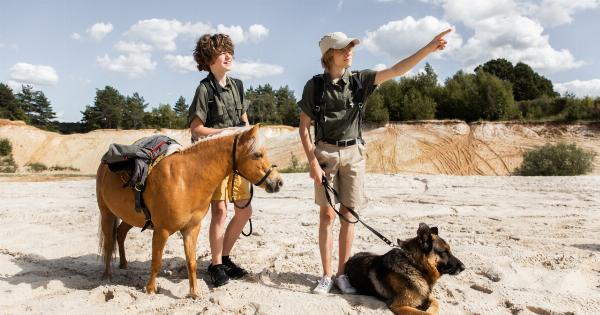Adolescence is a critical period in a person’s life, marked by a myriad of physical, emotional, and social changes.
During this time, teenagers often engage in various habits and behaviors that may appear innocent at first but can inadvertently lead to their involvement in sexual activities. It is essential to understand the factors that contribute to this phenomenon to effectively address the issue and provide appropriate guidance and education to teenagers.
Peer Pressure and Curiosity
One of the primary drivers behind teenagers engaging in sex is peer pressure.
Adolescents often feel a strong desire to fit in, and peer influence can lead them to engage in sexual activities even if they might not be emotionally or psychologically ready. In an attempt to gain acceptance or avoid feeling left out, teenagers may succumb to their peers’ expectations and engage in sexual behavior.
Curiosity is another innocent habit that can sometimes lead teenagers down the path of engaging in sex. As they transition from childhood to adulthood, adolescents become curious about their own bodies and those of others.
This natural curiosity, combined with limited knowledge and understanding about sexual matters, can prompt teenagers to explore their sexuality with their peers or engage in risky sexual behaviors.
Media Influence
The media plays a significant role in shaping teenagers’ perceptions and attitudes towards sex. Adolescents are exposed to a constant barrage of sexual content through television shows, movies, music videos, and social media platforms.
This exposure can create unrealistic expectations about sex and relationships, leading teenagers to feel pressured to engage in sexual activities at an earlier age.
The media often portrays sex as something casual and consequence-free, downplaying the potential emotional and physical risks involved.
Teenagers who consume such media are more likely to develop a skewed understanding of healthy relationships and consent, blurring the line between what is acceptable and what is not.
Alcohol and Substance Abuse
When teenagers engage in alcohol or substance abuse, their inhibitions are lowered, and their decision-making abilities become impaired.
Engaging in drug or alcohol use can lead adolescents to engage in risky sexual behaviors that they may not have considered in a sober state of mind. Substance abuse can cloud their judgment, making them more vulnerable to sexual coercion, unprotected sex, and potential regret or consequences.
The combination of alcohol or drugs with the desire to fit in or seek acceptance among peers can create a dangerous environment for teenagers, increasing the likelihood of them engaging in sexual activities when they are not emotionally or physically prepared for them.
Lack of Comprehensive Sex Education
Another crucial factor contributing to innocent habits leading to teenage engagement in sex is the lack of comprehensive sex education.
Many educational systems and communities shy away from providing comprehensive and evidence-based sex education, often opting for abstinence-only approaches or avoiding the topic altogether.
Without proper access to accurate information about sexual health, contraception, consent, and healthy relationships, teenagers are left to rely on myths, misconceptions, and unreliable sources such as friends or the media.
This knowledge gap can leave teenagers ill-prepared and uninformed when it comes to making informed decisions about their own sexual behavior.
Early Exposure to Pornography
The easy accessibility and widespread availability of pornography in today’s digital age contribute to the early exposure of teenagers to explicit sexual content.
Research suggests that adolescents who view pornography at an early age are more likely to engage in sexual activities earlier than their peers who have limited exposure.
Pornography often portrays unrealistic and distorted representations of sexual relationships, further contributing to misguided perceptions about sex, consent, and gender roles.
This early exposure can lead to a sense of entitlement, sexual objectification, and a more casual attitude towards sex, pushing teenagers towards participating in sexual activities prematurely.
Low Self-Esteem and Emotional Vulnerability
Teenagers often experience bouts of low self-esteem and emotional vulnerability as they navigate through the complexities of adolescence.
These emotional challenges can make them susceptible to seeking validation and a sense of belonging elsewhere, such as through engaging in sexual activities.
Seeking validation through physical intimacy may occur when teenagers feel inadequate or insecure. They may believe that engaging in sex will enhance their self-worth or help them feel more accepted and loved.
Unfortunately, this pursuit of validation through sexual encounters can have adverse emotional and psychological consequences, leaving teenagers feeling even more isolated and vulnerable.
Breakdown of Communication
Effective communication between parents and teenagers is crucial in navigating the challenges of adolescence.
When there is a breakdown in communication, teenagers may seek guidance and answers to their questions from alternative sources, such as their peers or the internet.
When parents or adults fail to provide open and non-judgmental spaces for teenagers to discuss their concerns, fears, and questions about sex, they might turn to their peers or unreliable sources online.
These alternative sources may perpetuate misinformation or provide misguided advice, potentially leading teenagers towards engaging in sexual activities without proper guidance or understanding.
Culturally Influenced Attitudes
Cultural and societal attitudes towards sex can significantly impact teenagers’ behaviors and attitudes. In some cultures, there may be a lack of open discussion around sex, rendering it a taboo topic.
This cultural silence can create an atmosphere of secrecy and misinformation around sexual matters, leading teenagers to seek answers and understanding through misinformed sources.
On the other hand, in cultures where sex is more openly discussed and portrayed, teenagers may feel more pressured to engage in sexual activities at an earlier age.
Cultural norms, peer pressure, and the desire to imitate what they see as acceptable or desirable behavior can inadvertently push teenagers into sexual encounters.
Conclusion
It is crucial to recognize that innocent habits can unknowingly lead teenagers into engaging in sexual activities.
Peer pressure, curiosity, media influence, alcohol and substance abuse, lack of comprehensive sex education, early exposure to pornography, low self-esteem, breakdown of communication, and culturally influenced attitudes all play a significant role in shaping teenagers’ decisions regarding sex.
Addressing these issues requires comprehensive sex education programs that promote accurate information, healthy relationship dynamics, consent, and emotional well-being.
Open communication channels between teenagers and trusted adults, such as parents, teachers, and mentors, are vital in providing guidance and support.
By understanding the underlying factors that contribute to innocent habits leading to teenage engagement in sex, societies and communities can work together to empower teenagers with the knowledge, skills, and confidence to make informed decisions and establish healthy boundaries for their sexual lives.






























